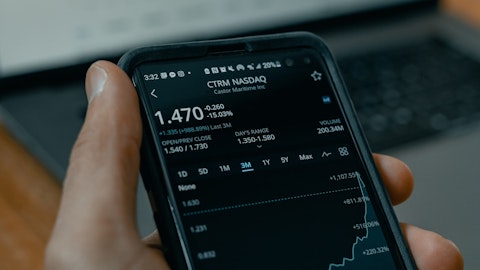Robert Berkley: I think that we are paying attention to medical care providers and the challenges that they are facing. By and large, most hospitals and health systems find themselves in a very difficult place if you look at, quite frankly, their financials, their economic models. It’s not sustainable. So ultimately, they’re going to have to figure out a way to improve their position. And they’re certainly not going to get a better result or a better outcome from the public sector or the government. So that leaves the private sector that they’re going to be looking to get their pound of flesh from to improve their position. In addition to that, while there’s been a lot of discussion and a lot of noise, I don’t see anything in the immediate term that is going — again for the private sector going to change the realities of pharma inflation.
So when we look out at where things are going, we think that there is a challenge ahead, and that is going to play a meaningful role in driving workers’ comp claim costs. In addition to that, we think, as I suggested, rating bureaus they seem to not be backing out the COVID frequency effect.
Mark Hughes: Do you think the same thing is happening in commercial auto, there’s too much reliance on the last couple of years, and that’s why it’s gotten more competitive. That’s why you tapered your business there?
Robert Berkley: I think there are a lot of challenges with commercial auto. I think certainly, one of them is people paying attention to frequency trend. But I think severity trend is for society, for the industry, is really the bigger issue. And when you look at the — how emboldened the plaintiff bar is at this stage, I think the commercial transportation industry has a bit of a bull’s eye on its chest, and we — who ensure them need to take that into account. And when you drive up and down I-95 at this stage, you see more billboards for plaintiff attorneys than you do for fast food. So that’s probably not a great sign.
Mark Hughes: And finally, anything on the audit premium that you noticed that might be some signal in the economy?
Robert Berkley: Yeah. Obviously, it’s a lagging indicator, but we continue to see auto premiums coming in at quite a healthy level, and we remain encouraged by that and what that means for our business and what that means at a more macro level to your point, for the health and well-being of the country. That having been said, we, I’m sure, just like you are paying attention to what type of Ts (ph) the interest rate hikes have for the economy and by extension, our clients.
Mark Hughes: Appreciate it. Thank you.
Robert Berkley: Thank you.
Operator: We’ll take our next question now from Alex Scott with Goldman Sachs.
Robert Berkley: Hi, Alex. Good evening.
Alex Scott: Hey. Good afternoon. First one I have is just a follow-up on workers’ comp. I guess we’ve seen some reasonably large numbers in terms of potential decreases in NCCI. I’m just trying to understand how much pressure we should be thinking about there? I know your book is a little more nuanced than that, and there’s a lot of excess and so forth. So I just wanted to understand from you all because it sounds like you still have a view of loss trend that certainly sounds like maybe from your comments is at least positive, let alone may be materially positive versus just big price downs that we’re seeing kind of coming out of NCCI. So can you help me think through that? And what kind of impact that may have on the business going into 2023?





